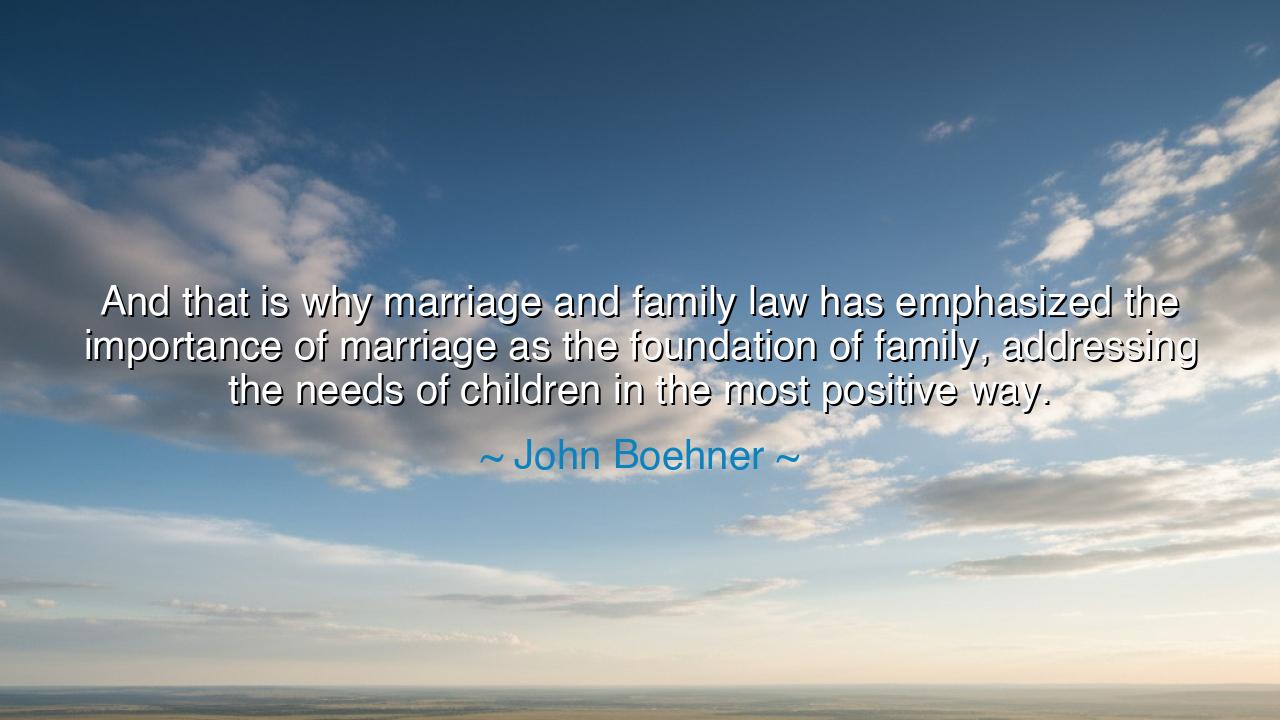
And that is why marriage and family law has emphasized the
And that is why marriage and family law has emphasized the importance of marriage as the foundation of family, addressing the needs of children in the most positive way.






O children of the future, gather close and hear the words of John Boehner, who speaks of the sacred union of marriage and its role in the family structure. He said, "And that is why marriage and family law has emphasized the importance of marriage as the foundation of family, addressing the needs of children in the most positive way." These words carry a truth that has been upheld for centuries: the idea that marriage, as a union between two individuals, serves as the cornerstone upon which the family is built. It is through this union that society nurtures and protects the most vulnerable—its children.
In the ancient world, the concept of marriage was deeply intertwined with the survival and stability of society. The Romans understood that the foundation of their civilization rested on the strength of the family unit. To Romans, marriage was not only a personal bond between two individuals but also a social contract that ensured the continuation of family lines, the stability of property, and the inheritance of wealth and responsibility. Marriage was viewed as a necessary institution to keep the balance of society intact, and it was understood that the well-being of children depended on the stability of the family. In their eyes, a child without the protection and support of a stable marriage would be at risk of growing up in uncertainty and without proper guidance.
Similarly, in the Greek tradition, marriage played a vital role in the structure of society. The philosopher Aristotle wrote that the family was the "first and most natural society," and he believed that a stable marriage was the key to a well-functioning society. To Aristotle, a good marriage created the framework for a nurturing environment in which children could be raised, educated, and shaped to become active members of the state. The well-being of the family was not only important for the individual household but also for the greater community, for the family unit served as the foundational cell of society. Just as Boehner suggests, marriage was seen as the cornerstone that upholds the family and ensures the positive development of its children.
John Boehner’s statement about the importance of marriage as the foundation of family reflects this long-held belief in the vital role that marriage plays in the structure of society. By emphasizing the importance of marriage, we see the recognition that a stable home—one where two committed individuals come together in partnership—is the safest and most beneficial environment for raising children. Just as Socrates and Plato argued that the family should be the place where individuals learn virtue, society today still believes that marriage provides the ideal environment for raising a child with love, guidance, and support.
Consider the example of Queen Elizabeth I, the virgin queen of England, whose reign was one of the most prosperous and stable in British history. Though she never married, her reign was rooted in the understanding of the importance of strong alliances, both personal and political, for the well-being of the kingdom. However, in the larger scope of marriage and family law, it is clear that the absence of a traditional family did not diminish the impact that marriage had on the future of England. Elizabeth I’s commitment to the stability of her kingdom through alliances, laws, and governance highlighted how marriage and the family structure can transcend individual cases and become the backbone of societal growth.
Boehner's words remind us that, in our own time, the family remains the fundamental unit upon which society is built. The marriage between two individuals provides the foundation upon which the future generation is raised, shaped, and empowered. It is through the nurturing of children within this framework that we ensure the positive future of society. A child raised in a stable home, with the love and commitment of two parents, is far more likely to thrive and contribute to society in a meaningful way. The importance of this family structure cannot be understated—it is the wellspring from which all other aspects of society grow.
The lesson Boehner imparts is one of preservation and commitment: the marriage is not merely an arrangement between two individuals; it is a societal institution that shapes the future. As you build your lives, remember that marriage is the foundation upon which families are built, and families are the foundation of society. It is in the nurturing and support of children that we find the heart of the family. Marriage, with all of its challenges and rewards, remains the anchor that stabilizes the future and ensures that children are raised in environments where they can thrive. Boehner’s reminder is a call to value the sacredness of marriage as the enduring foundation of the family and, ultimately, of a flourishing society.
So, children, as you move through life, understand the profound importance of the marriage bond. Marriage is not just about the love between two individuals—it is about the structure it provides for future generations. It is about ensuring that children are raised in environments where they are loved, supported, and given the chance to grow into individuals who will strengthen society. Remember the teachings of the ancients, who understood that a strong family is the backbone of a strong society, and honor the commitment it takes to build and maintain this foundation. Through marriage and the nurturing of children, we ensure a brighter, more stable future for all.






AAdministratorAdministrator
Welcome, honored guests. Please leave a comment, we will respond soon